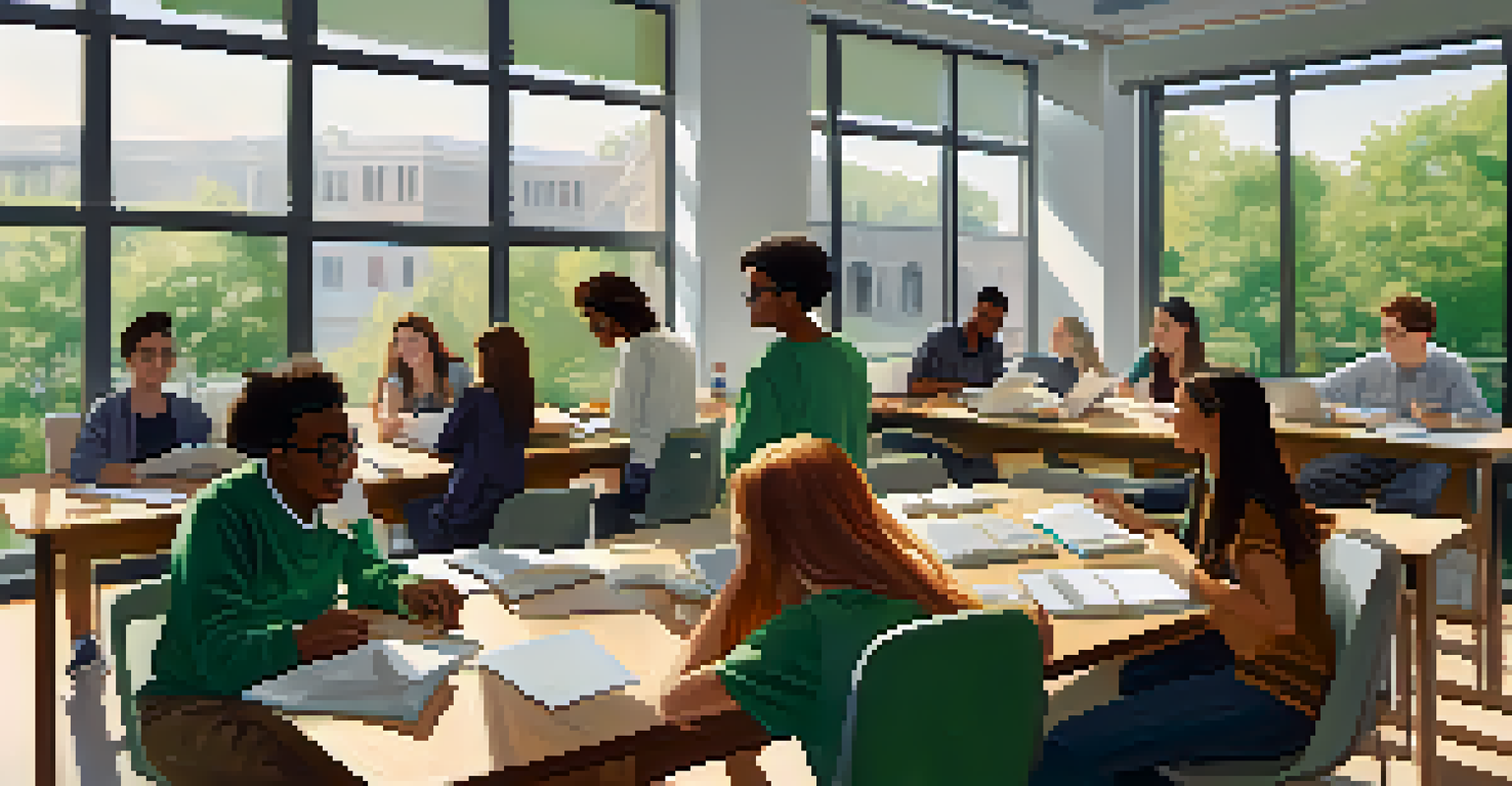Developing Critical Thinking Skills for Self-Directed Learners

Understanding Critical Thinking and Its Importance
Critical thinking is the ability to analyze information, evaluate evidence, and form reasoned conclusions. It’s essential for self-directed learners who take charge of their education. By honing these skills, learners can navigate complex situations and make informed decisions that affect their personal and professional lives.
The mind is not a vessel to be filled, but a fire to be kindled.
Imagine critical thinking as a compass guiding you through the dense forest of information we encounter daily. Without this compass, it's easy to get lost or misled by misinformation. In essence, critical thinking empowers you to sift through the noise and discover what truly matters.
Moreover, developing critical thinking skills can enhance your creativity and problem-solving abilities. As you learn to assess various viewpoints and synthesize ideas, you’ll become more adept at generating innovative solutions to challenging problems.
Identifying Your Learning Style and Needs
Before developing critical thinking skills, it's crucial to understand your unique learning style. Are you a visual learner who benefits from diagrams and charts? Or do you prefer hands-on experiences that engage you physically and emotionally? Recognizing your style can inform how you approach critical thinking.

For instance, if you’re a visual learner, using mind maps can help you organize your thoughts and analyze information visually. On the other hand, auditory learners might benefit from discussing ideas with peers or listening to podcasts that challenge their perspectives.
Importance of Critical Thinking
Critical thinking enables learners to analyze information and make informed decisions in their personal and professional lives.
Knowing your learning style not only boosts your engagement but also allows you to tailor your critical thinking exercises. This personalized approach can lead to more meaningful insights and a deeper understanding of the material.
Cultivating Curiosity as a Foundation for Thinking
Curiosity is the spark that ignites critical thinking. When you approach learning with a curious mindset, you naturally ask questions that lead to deeper understanding. Instead of passively absorbing information, you become an active participant in your learning journey.
Critical thinking is the key to a successful life, as it allows individuals to navigate the complex world we live in.
For example, when you encounter a new concept, ask yourself: 'Why is this important?' or 'How does this relate to what I already know?' This questioning technique not only clarifies your thoughts but also encourages you to explore beyond the surface.
Furthermore, embracing curiosity can open doors to new perspectives and ideas. As you seek answers, you might stumble upon unexpected insights that enrich your learning experience and enhance your critical thinking capabilities.
Practicing Analytical Thinking Through Real-World Scenarios
Analytical thinking involves breaking down complex information into manageable parts. One way to practice this skill is by examining real-world scenarios that challenge your reasoning abilities. For instance, consider current events or case studies relevant to your field of interest.
As you analyze these scenarios, identify the main arguments, evaluate the evidence, and draw conclusions. This process not only sharpens your analytical skills but also enhances your ability to apply critical thinking in practical situations.
Understanding Learning Styles
Recognizing your unique learning style can enhance engagement and tailor critical thinking exercises for deeper understanding.
Additionally, discussing these scenarios with peers can provide fresh insights and foster collaborative learning. Engaging with others helps you see different angles and encourages a richer understanding of the material.
Embracing Reflection for Continuous Improvement
Reflection is a powerful tool for self-directed learners. Taking the time to evaluate your thoughts, decisions, and learning experiences can reveal patterns and areas for growth. By regularly reflecting on your learning process, you can develop a more nuanced understanding of your critical thinking skills.
For instance, after completing a project, ask yourself what worked well and what could have been improved. This practice not only helps you identify strengths and weaknesses but also fosters a growth mindset that encourages continual learning.
Moreover, incorporating journaling into your routine can provide a space for structured reflection. Writing down your thoughts allows you to articulate your reasoning and track your progress over time.
Engaging in Discussions to Sharpen Your Thinking Skills
Engaging in discussions with others is an excellent way to hone your critical thinking skills. Conversations challenge your viewpoints and force you to articulate your thoughts clearly. By exchanging ideas, you can refine your reasoning and become more comfortable with constructive criticism.
Consider joining study groups or online forums where diverse perspectives are welcomed. These environments encourage open dialogue and can expose you to different ways of thinking that you might not have considered before.
Engagement Through Discussions
Participating in discussions and debates helps refine your reasoning skills and exposes you to diverse perspectives.
Additionally, don’t shy away from debates. Healthy debates can push you to defend your viewpoints and think on your feet, which ultimately strengthens your critical thinking abilities.
Utilizing Resources to Enhance Your Learning Journey
In today’s digital age, a wealth of resources is available to support your critical thinking development. From online courses to articles and podcasts, there’s no shortage of materials to help you grow. Identifying reputable sources can help you stay informed and engaged.
For example, platforms like Coursera or edX offer courses specifically focused on critical thinking skills. These resources often include exercises that challenge your reasoning and analytical abilities in a structured way.

Moreover, books on critical thinking and problem-solving can provide valuable insights and techniques. Investing time in these resources can significantly elevate your learning journey and enhance your overall skills.